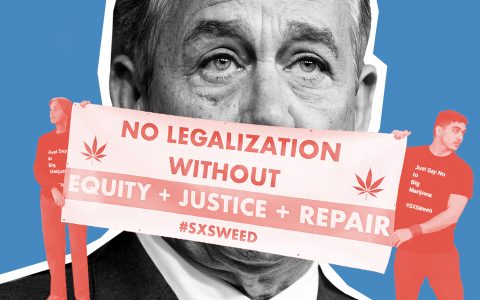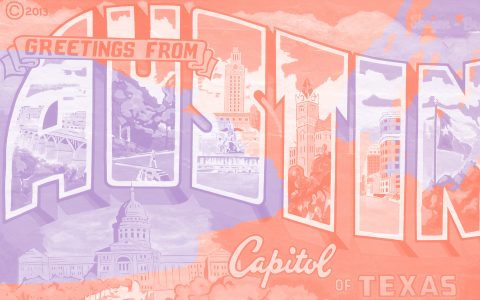‘The Haymaker’ is Leafly Deputy Editor Bruce Barcott’s opinion column on cannabis politics and culture.
The cannabis industry’s equity problem has long been a ticking time bomb. This week it finally exploded.
In Albany, a legalization measure that once seemed as unstoppable as a locomotive ran completely off the rails. The push to include adult-use cannabis legalization in the New York Legislature’s 2019 state budget package officially died on Monday.
Here’s the new math. No social equity = no legalization and no marketplace.
As Leafly’s Max Savage Levenson reported, death resulted from multiple causes—bickering over taxes, conservative lawmakers catching a case of cold feet, law enforcement pushback, even a corporate-backed plot to ban homegrow. But in the end, even the most ardent legalization advocates couldn’t defend the package’s weak tea equity measures.
Those same legislators warned months ago that there would be “no legalization without social equity.” Hat-tip to Leafly contributor Sara Brittany Somerset for surfacing that back in December. She quoted Crystal Peoples-Stokes, the majority leader of the New York State Assembly, who was very clear about what she needed to see in a legalization measure:
“Equity in a regulated adult use market starts with separating licenses, providing an affordable licensing process, offering low-interest loans, and prioritizing opportunities to people historically disenfranchised and imprisoned as a result of the war on drugs.”
Marijuana Justice and Equity workshop @BPHACaucus starting now! Meeting room 6. @CPeoplesStokes opening remarks on why legalization has to be done the right way. This is not a new topic — we’ve been talking about this for a long time. Let’s *create* the way this happens. pic.twitter.com/xnPbWBxsl1
— DPA NY Policy Office (@DPA_NY) February 16, 2019
As Somerset wrote: “The bottom line according to Peoples-Stokes: Adult-use marijuana will not be implemented in New York State if it is not inclusive of equity.” The majority leader was not joking.
But apparently others weren’t listening. Cannabis companies, dazzled by the prospect of adult-use legalization in a state with 20 million people, seemed only concerned about locking up licenses and monopolizing market share. They ignored the calls for equity clauses and criminal record expungement. They didn’t listen to experienced thought leaders like Massachusetts Cannabis Control Commissioner Shaleen Title or the leaders of the Minority Cannabis Business Association, both of whom have issued best-practices policy guidances that address these issues.
Result: Cannabis companies got neither their licenses nor adult-use legalization. In past years, legalization advocates were willing to back-burner social equity requirements in order to get legalization adopted. Just pass the measure, went the thinking. We can improve and perfect it later.
No more. We’ve seen what happens: no improvement, no perfection.
Here’s the new math in 2019. No equity = no marketplace.
Equity Matters to Politicians
Why did equity and expungement mean so much to leaders like Crystal Peoples-Stokes? Because those aren’t merely concepts to many of her constituents in Buffalo. Their lives were derailed by the racist war on drugs. And she’s seen equity and expungement programs in other states ignored, unfunded, understaffed, and shunted off to the basement of afterthought programs.
In past years, legalization advocates were willing to abandon tough equity requirements in order to get legalization passed. Not anymore.
Look at the wreckage. In California last week, the Bureau of Cannabis Control’s social equity grant program came to a mysterious halt. Or pause. Or reset. Nobody’s quite sure. Even John Schroyer over at MJBiz Daily is baffled, and that guy knows everything. California’s got $10 million in grant money available but no way for anyone to apply for it.
Meanwhile, the City of Los Angeles seems to have its own $10 million available for cops to crack down on unlicensed cannabis stores, but not a dime to spare for the city’s cannabis social equity program. Cat Packer, head of LA’s Department of Cannabis Regulation, has been fighting tooth and claw since early 2018 to get a coffee maker and a copy machine, let alone social equity money. Meanwhile, the LAPD sneezes and the city council tosses it 10 large.
This has not been lost on the people fighting the good fight in New York. They are no fools. Kassandra Frederique, head of the Drug Policy Alliance’s New York office, connected the dots in a single tweet:
This is exactly what can NOT happen in NYS @NYGovCuomo @CarlHeastie @AndreaSCousins – this is why @CPeoplesStokes and @LizKrueger are fighting for funds to be earmarked and locked boxed for community reinvestment and providing support to communities most impacted to be in biz https://t.co/cxYLaY2BLq
— Kassandra Frederique (@Kassandra_Fred) March 18, 2019
That’s Not a Good Look
Know what also matters? Dollars and optics. And here again the cannabis industry—though there are exceptions—has lately come up Scrooge-fisted and obtuse.
In mid-March, while legalization and social justice advocates were busting their butts in Albany, former US House Speaker John Boehner chortled his way through an explanation of his cannabis evolution on the big stage at SXSW in Austin, Texas.
Evolving on cannabis is always a net good. That’s how progress happens in human society. But the optics of Boehner, a man who directly pushed and funded the war on drugs, watching his Acreage Holdings investment multiply while others still sit in prison, were enough to make a lot of us squirm.
Who’s Playing Who Here?
As the Boehner Q&A unfolded, legalization advocates like Jax Finkel, executive director of Texas NORML, worked the halls of the statehouse a couple miles away, her chapter surviving on a shoestring budget. When I spoke with her in the bowels of the capitol building in late February, Finkel sounded perplexed by the lack of financial support advocates like herself had received (or rather, not received) from cash-flush industry players.
Finkel didn’t say it, but the question has occurred to a number of people: Are these cannabis capitalists just playing the grassroots advocates for chumps? Right now the answer is yes. They’re letting the activists spend blood, sweat, and tears, holding tight to their bags of cash until the legal market opens. Then, as they say in Texas, Katy bar the fucking door.
This has got to change or there will be more New York debacles in 2019 and 2020. Adult-use legalization is now being seriously considered by legislators in Connecticut and Illinois. New Jersey—which has its own set of unique issues—will take it up again soon. Pennsylvania Gov. Tom Wolfe says he’s open to a serious consideration of adult-use legalization.
Those are big states. Big markets. And they may remain closed as long as the cannabis industry refuses to take into consideration anything other than its own pockets.














